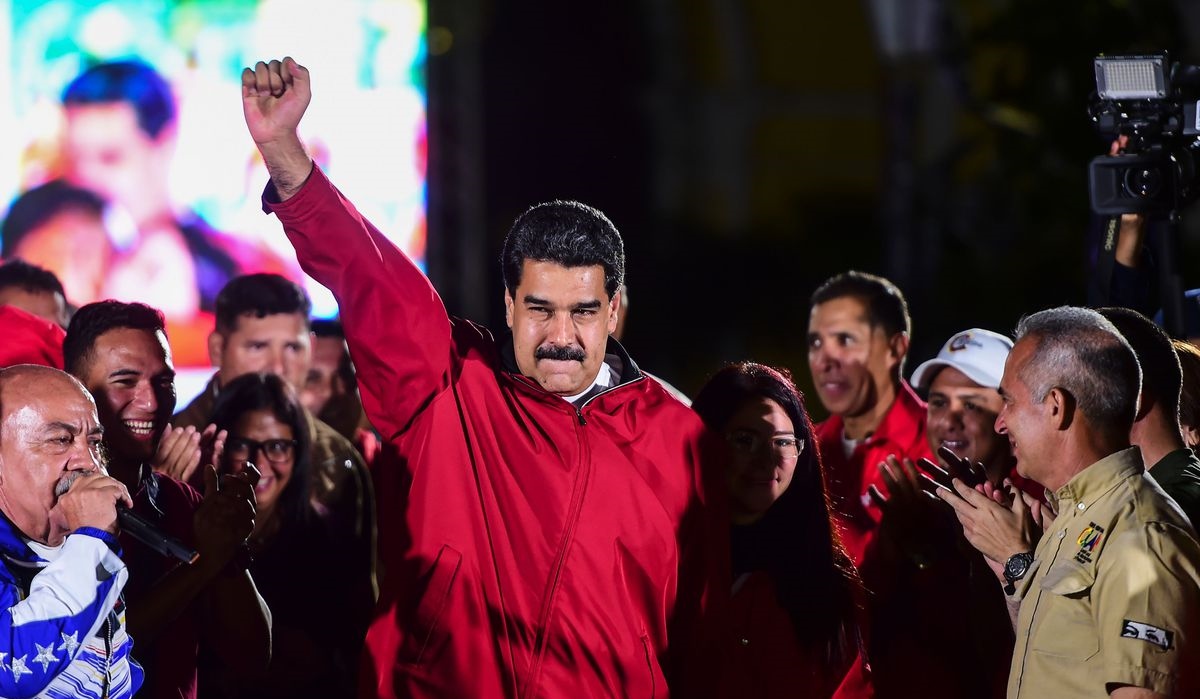Maduro in power
May 21, 2018 | Expert Insights

Nicolas Maduro has reportedly won re-election for another six-year term in Venezuela. The controversial elections had been boycotted by the opposition and witnessed a voter turn-out of 46.1%.
Background
The Republic of Venezuela is located in northwest South America. The country stretches across over 900,000 square kilometres. It is bordered by the Caribbean Sea in the north, and Columbia, Guyana, and Brazil in the west, east, and south, respectively. Venezuela was colonised by Spain in 1522 and became the first Spanish territory to declare independence from the empire in 1811. Venezuela suffered political turmoil and autocracy, remaining dominated by regional military rule until the mid-20th century.
In the early 20th century, Venezuela discovered oil and has since become the world's largest known oil reserve and one of the leading exporters of oil. However, despite this, many Venezuelans live in abject poverty.
Nicolas Maduro took office in 2013. Under his rule, there has been a rise in inflation and a shortage of basic goods. A drop in oil prices has added to the administration’s problems. The nation’s economy has become increasingly unstable and there if hyperinflation in the region. Inflation is projected to rise to 13,000%. As of 2017, the country had only $10 billion in reserves and a debt of $120 billion. The country is undergoing a refugee crisis with thousands of citizens fleeing conditions of rapidly declining economic, health, and safety conditions. Read more on Venezuela’s refugee crisis here.
Due to the current regime’s lack of regard for democratic process, the country has multiple sanctions imposed on it by the EU and United States. Earlier this year, Venezuelan President Maduro launched a cryptocurrency “Crypto” to circumvent sanctions imposed by the US government.
Analysis
In 2017, Maduro was heavily condemned for creating a new Constituent Assembly that would give him and his allies unprecedented power. At the time, it was alleged that the vote that took place to instate the Assembly had been rigged – a claim that Maduro has denied. However, the company that provided the voting machines said that the government’s claims were off by at least one million.
The general election in Venezuela was held in May 2018. Despite the elections being marred by opposition boycott and controversy, it has been announced that Maduro has won the re-election. He will serve for another six-year term.
“This was a historic day! The day of a heroic victory! The day of a beautiful victory - of a truly popular victory,” Maduro shouted during a rally filled with his supporters. “The whole of Venezuela has triumphed! Democracy has triumphed! Peace has triumphed! Constitutionality has triumphed [These were] elections that were constitutional, legitimate and legal,” he insisted, before claiming: “We have a president of the people! A working president!”
According to the latest data, the election witnessed a turnout of only 46.1%. This is due to the fact the main opposition in the country boycotted the elections. The National Election Council revealed that Maduro won nearly 68% of the votes in Sunday's election, beating his nearest challenger Henri Falcon by almost 40 points.
However, opposition leaders as well as the international community have alleged that these were not fair and free elections. Many have claimed that the votes were likely rigged. “All Venezuelans know what happened today,” tweeted Henrique Capriles, who narrowly lost to Maduro in the 2013 election. “Our beloved Venezuela must have truly free and democratic elections where the will of our People is reflected in the result.” It should be noted that Capriles had been barred from running for elections again after 2013.
The president of Chile, Sebastián Piñera, said that his country, “like the majority of democratic countries”, would not recognise the vote. “Venezuela’s elections do not meet the minimum standards for a true democracy. They are not clean or legitimate elections and they do not represent the free and sovereign will of the Venezuelan people,” Piñera wrote. The US has also indicated that it would not recognize the results of the elections.
Maduro for his part has denied any manipulation by the government and has stated that his first goal would be to stabilize the Venezuelan economy.
Assessment
Our assessment is that Venezuela is in the midst of an economic and humanitarian crisis that is unlikely to be resolved due to the outcome of these elections. Maduro, in the past, has ignored his critics and has worked towards accumulating more power. This comes during a period when the citizens of the nation do not have access to basic resources like food, water, and medicine. There are additional concerns regarding the state of the nation’s democracy if the elections really have been rigged.
Read more: Maduro seizes Kellogg factory








Comments